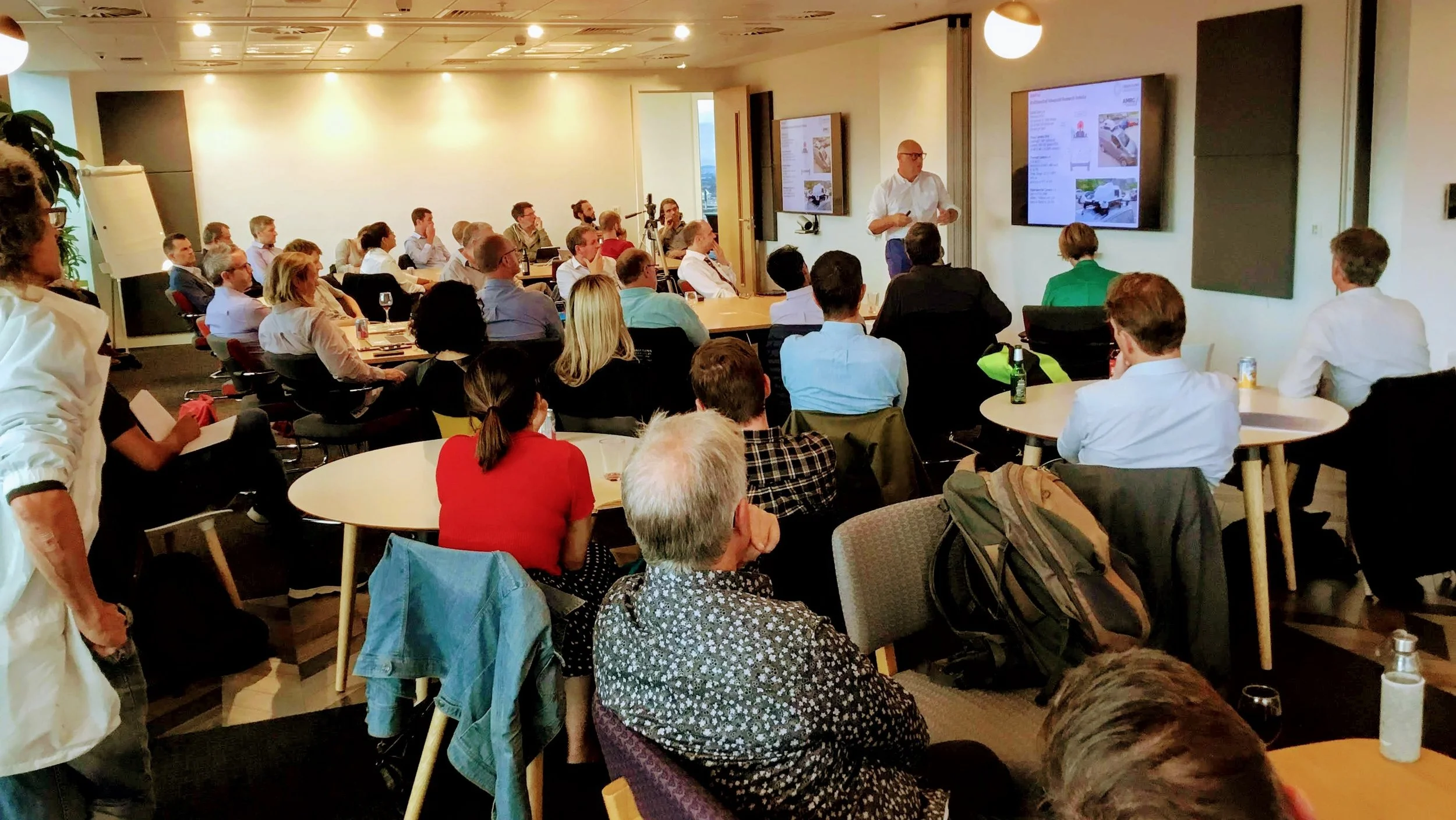Notes from Meetup #14: New Ways to Get About
On Monday the 4th November we gathered for the 14th instalment of the SmartSheffield meetup, and for the first time in the conference space at the Electric Works in Sheffield’s Digital Campus - thanks to Creative Space Management for the use of the venue and all the lovely food and drink you laid on for us!
The theme of this edition was the Future of Transport and we were treated to four excellent talks on the subject from our guests, covering a wide range of local activity that really showed the amount of activity there is in this area and the contribution that Sheffield can make to these crucial national and global debates on how people and goods should and will move around in the future.
Here follow are summaries of these talks, along with my regular news slot at the end.
Please get in touch (info@smartsheffield.city) if you have any news that should be featured at the next event, and if you’ve got a topic that you would like to present!
Thanks everyone for coming and making our first event at Electric Works such a success (and I hope those of you who tried out the famous stainless steel helter-skelter had fun doing so!)
Pete Zanzottera, Active Travel Project Director for Sheffield City Region
Pete was appointed shortly after the region’s Active Travel Commissioner Dame Sarah Storey was appointed by the SCR Mayor Dan Jarvis.
Between them they agreed four pledges to guide their work:
We'll be led by our communities.Meaning they are not in the business of doing things to people, but enabling them to do things themselves.
We’ll enable active travel, not just encourage it.There's been no real change in the proportion of people cycling in decades - it's not that people don't cycle because they don't want to, it's because they don't feel safe.
All our infrastructure will meet or exceed our requirements.This means, for instance, no longer focusing on shared use pavements that are shown not to work effectively.
All of our infrastructure will be accessible to all.Which means making pavements and cycle paths wide enough for four-wheeled human-powered vehicles and for partially sighted people to stay next to their guide, etc.
To achieve this, SCR are soon to submit their bid into the Government’s Transforming Cities fund, of which roughly £110m is earmarked for active travel. This money will need to be spent over the subsequent three years, and thus presents quite a challenge to get plans in place to spend such a large amount of money wisely.
There will be a draft of the active travel implementation plan for input, and they are currently engaged in mapping what the active travel network should look like. They will then work with Government to change the way improvements are funded going forward, so that instead of piecemeal interventions, walking and cycling are treated the same as other modes of transport with money provided for projects in a joined up way with decisions made locally so that the network is connected properly.
Pete than also demonstrates the new Sheffield City Region Interactive Active Travel Map, which invites the public to associate comments about the walking and cycling infrastructure with specific locations.
The map had been live for three weeks at the time of the talk, and has received excellent uptake so far. It has received 1,980 comments from 636 registered users, with 3,2546 unique visitors to the map and 5408 comment upvotes. There have also been no comments rejected by moderators, which indicates that the initiative is being taken seriously by the public, which is also encouraging.
This is great engagement, and it will hopefully continue for the next few months so that the region can make better informed decisions as they plan their spending in the coming years.
The map will remain open until the end of March 2020, so please add your comments to it!
You can contact Pete about these issues at Pete.Zanzottera[at]sheffieldcityregion.org.uk, or on Twitter @PeteZanzottera.
Phil White, Associate at Ove Arup Group
Phil has recently completed a Review on the Future of Mobility for the Sheffield City Region, and took us through his findings in advance of the report’s publication.
The review tries to encompass current developments in technology and the availability of data and data science and the potential of these to change the way we move around in the future, and in particular the likely impact on our region. This work feeds in to the region’s focus on transport and digital technology as key areas of development, along with the emerging local industrial strategy. Alongside these factors are the need to reduce the carbon impact of transport, and ongoing constraints on public sector budgets within the region.
The report looks at the following major themes, or areas of change:
Governance - the difficulty of staying abreast of developments in technology and the need for policy, regulation and decision making, both nationally and locally. This is especially true with regard to the availability and use of data, and the need to ensure that changes to the way we move people and goods are inclusive and accessible to everyone.
Data and Digital Lifestyles - which on the one hand means understand what data is available and how it is collected and processes, and on the other how users engage with it through their devices and what their expectations are in terms of convenience and accessibility.
Integrated Ticketing and Mobility and a Service (MaaS) - this is the integration of mobility services into a seamless experience to the traveller.
The report looks at the future of public modes of transport:
Active Travel - covering cycling and walking but also micro-mobility solutions such as electric scooters (which are illegal in the UK currently), dockless bike schemes, etc.
Future of Buses - buses currently account for around 9% of travel in the region, and are very important but could be improved and done differently, for instance shifting to high-frequency routes in some places, and demand-responsive routes in others, or changes to the technology itself, such as running on electric or hydrogen power or autonomous operation, etc.
Mass Transit - looking primarily at trams and tram/trains and similarly to the future of buses how existing infrastructure can be used differently and technological advances in power trains, autonomous operation, responsive data-driven timetabling, etc.
Low Emission Vehicles - looking for instance at hydrogen as SCR has some unique capabilities in this area with ITM Power being located here, but also smart grid and battery technologies.
Connected and Automated Mobility (CAM) - some predictions state that 30% of our travel will be via autonomous forms of transport by 2030, and while this remains to be seen, there's no doubt that significant developments are being made in this area which makes an assessment of the region’s readiness worthwhile.
Logistics - this is a major factor in the SCR as it’s a significant national hub for distribution and the impacts of low-emissions and automation on this aspect of transport is of great interest as well.
Phil showed how they have mapped the region’s assets in each of these areas, which is included in the Executive Summary of the review, and invited us to add any additional information to it if we identified gaps.
He then described the 5 key moves the region could take now in order to put SCR at the forefront if these changes in the way people and goods move:
Publicise the great work already underway in the future mobility space in Sheffield City Region.
Create a transport data platform for Sheffield City Region.
Identify and realise opportunities to test future mobility technologies.
Foster a network of mobility technology companies and service providers.
Review changes to the governance and regulation of SCR’s transport system to deliver future mobility solutions.
There are a further 14 specific recommendations in the report.
Sam Chapman, Chief Innovation Officer at The Floow
The Floow specialise in vehicle telematics and data analysis primarily for the insurance industry, but they are also increasingly developing risk models for us in trials of autonomous and connected mobility, and Sam talked us through some of their recent, and fascinating, work in this area.
Fundamentally this work is an extension of their core mission which is to understand locational driver behaviour, i.e. how do drivers behave in different situations and under different conditions which is highly relevant for autonation, both in terms of predicting the behavior of other road users, but also in modelling and simulating real world behaviour, i.e. so that autonomous vehicles behave in similar ways to real people (just think about when and why people sometimes let other vehicles out of side streets).
The Floow are engaged with a whole range of stakeholders across universities, government, industry and major vehicle OEMs, in gathering and analysing data, and trialling new technologies that will potentially have a transformative impact on the autonomous sector in the future. Sam provides insight into a number of specific projects including exercises in Sheffield and Greenwich. This data gathering doesn’t just include tracking the vehicles’ surroundings, but also the physical inputs the driver makes as they operate the controls, which is then subsequently analysed for anomalies that might represent an unusual situation or threat.
Sam showed a series of fascinating animations that visualise the insights they have been able to gather, including false positives and mis-identifications such as where a plume of car exhaust smoke in cold conditions fools the tracking systems into thinking it’s another vehicle and would have triggered the emergency braking system if the vehicle had been under autonomous control at the time. Some of these issues relate to the interpretation of data, but others expose the limitations of the current state of the technology itself, such as sensors not being able to see around corners sufficiently, or cameras not being able to produce sufficient framerates in low light and at high speeds.
As Sam explained, a lot of this technology is useful in certain circumstances, but not in others. What they are looking at is how transport is changing in the near term - what kinds of technologies are ‘near to market’, and what kinds of situations they can be applied in.
It’s therefore crucial to know where conditions are such that these systems are able to work well, and where they are not, and producing the answers to this question is another major part of the work that The Floow do - mapping the transport networks, not just for motor vehicles but for active travel as well, in order to create risk models for specific geographies that can be used in the next generation of vehicle safety systems. In the course of this work, they have been able to identify ‘regional dialects’ in the behaviour of drivers, with notable differences between cities even within the UK. These insights are now being used to improve behaviours in specific neighborhoods and at accident blackspots.
Sam finishes with a plea to do more of this kind of work in Sheffield - his firm are engaged in many places across the country and internationally, but would very much like to do more to understand and develop mobility right here in their home city and region!
Dexter Johnstone and Andrew Rodgers from Cycle Sheffield
Cycle Sheffield are a campaign group, advocating for a “cycle friendly Sheffield where anyone can choose to make journeys by bike, [and where cycling is] inclusive, accessible and easy, not limited to the quick and the brave.”
They recently worked with Sheffield City Council to close Division Street to motor vehicles for a weekend over the 19th and 20th October, which has been an aspiration amongst groups like Cycle Sheffield, Living Streets, and others for a long time now. The catalyst for it actually being trialed this time, though, was an animation showing what a car-less Division Street could look like created and shared on social media by Cycle Sheffield member Sam Wakeling, which got a lot of traction and broke into the local mainstream. This led to stakeholder meetings being convened and the conversation with the council shifting to practical logistics rather than just staying conceptual, and ultimately resulted in the trial taking place over that weekend in October.
The motivation for this, from Cycle Sheffield’s perspective is to try to show how the issues caused by car-first street design - congestion, air pollution, safety, etc. - could be addressed relatively quickly and cheaply - that making these changes isn’t an insurmountable challenge, but can be tackled locally. They also wanted to demonstrate that there is public support for this, and that businesses wouldn’t be negatively affected by the lack of vehicle access, but that to the contrary footfall would increase as pedestrians and cyclists were provided easier access to the street-side shops and hospitality businesses.
And finally, they also wanted to get more people thinking and talking about the underlying question: Should we be using our city’s public spaces primarily for the storage and movement of private motor vehicles?
The trial was generally very well received, and Dexter and Andrew are now working with other communities in and around Sheffield to identify other locations where such measures could also be tested.
Finally, their message is that if you’re not happy with the roads that are around you and the roads that you use, then ask for things to change. Cycle Sheffield did, and they found that the political will to do something different has perhaps never been stronger.
Chris Dymond - SmartSheffield News
As per usual I closed the evening with the latest local smart city related things that have crossed my information horizon…
Sheffield's "Big City Conversation"
Sheffield City Region Active Travel Map
Sheffield Schools Environment & Recycling Taskforce
Tram Train marks 1m passenger journeys
#GoGoGreen, the green barrier at Hunters Bar Infant School , Launched
Sheffield Things Network Update
Upcoming Events:
Spaces for Creation - Negotiating the City, 14/11/2019 @ Site Gallery
Urban Flows Datahack, 23-24/11/2019
DecarboN8 Launch, 25/11/2019 in Leeds
IoT Sheffield on Smart Cities, 5/12/2019 @ University of Sheffield
Right, that’s it for another edition - we’re already looking forward to the next one which will be held in early January in conjunction with the Pitch-In Project at the Diamond Building!








